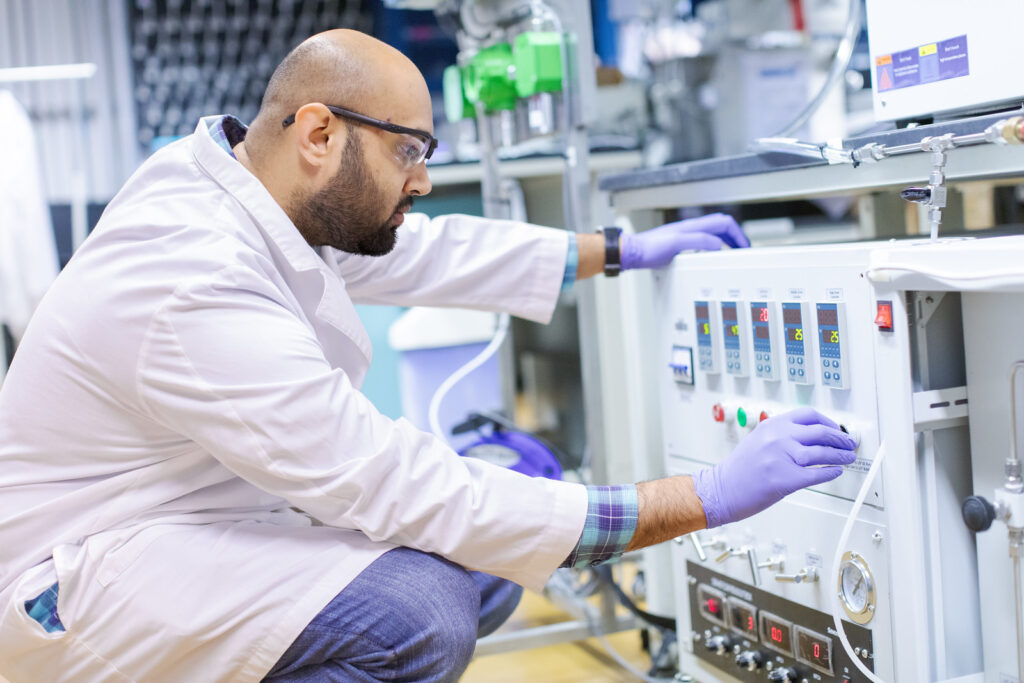
What is your role with TEES/GFRC?
Dr. Sufiyan Challiwala: I serve as a Research Scientist at TEES/GFRC, primarily focusing on topics related to gas processing and CO2 utilization under the guidance of Professor Nimir Elbashir’s research team.
What is the focus of your research? How did you get interested in the topic?
Dr. Sufiyan Challiwala: My primary involvement centers on the advancement and market readiness of the innovative CARGEN® Technology. This revolutionary method transforms greenhouse gases, notably CO2 and CH4, into solid carbon nanotubes and syngas. Additionally, my expertise extends to projects that emphasize CO2 utilization and the energy transition, particularly in the realms of organic carbonates production, sustainable aviation fuels, and the creation of golden hydrogen – a unique hydrogen variant from the CARGEN® process with a negative CO2 impact.
From my early academic years, witnessing the repercussions of climate change solidified my resolve to combat industrial greenhouse gas emissions. This drove me to pursue chemical engineering, gearing me towards this vital mission. Over time, I’ve honed my skills and am now actively shaping the trajectory of the CARGEN technology – an emblematic solution that turns environmental challenges into viable opportunities.
What is the expected outcome and the potential real-world impact of your research?
Dr. Sufiyan Challiwala: My research endeavors are pivotal in propelling the CARGEN® Technology towards broader adoption and commercial viability. By doing so, it promises substantial decarbonization across various global industries, paving the way for realizing net-zero emission objectives.
What stage is your project in/any interesting findings so far?
Dr. Sufiyan Challiwala: At present, our team has successfully demonstrated a proof-of-concept for the CARGEN® process at the bench-scale level. This journey, spanning nearly eight years, has heralded numerous groundbreaking discoveries, resulting in a series of notable publications and inventions.
Who are people/organizations you collaborate(d) with?
Dr. Sufiyan Challiwala: In collaboration with my esteemed colleague, Dr. Hanif Choudhury, and the dedicated members of our research ensemble led by Professor Nimir Elbashir, we’ve accomplished numerous projects. These encompass areas like Fischer Tropsch processes, natural gas reforming, and organic carbonates production, to name a few. Notably, the promise of CARGEN® Technology has garnered interest from major energy conglomerates, culminating in a collaboration for CARGEN 2.0 with Shell.
Can students get involved in your work?
Dr. Sufiyan Challiwala: Absolutely. I’ve had the privilege of guiding several Master’s and Undergraduate students through diverse facets of these projects. Currently, I’m mentoring three enthusiastic students within our research group. Their dedication and innovative approaches are not only enriching our ongoing projects but are also laying the groundwork for future endeavors, scholarly publications, and inventive solutions. Few of these examples are:
1. A Master student Zeinab Ataya studied the implementation of the CARGEN® Technology as a part of Gas to Liquid Process. Her project confirmed the applicability of CARGEN® Technology for decarbonizing the existing GTL plants while creating opportunity more economical and sustainable products. This project resulted in one publication and one patent application.
2. A Master student Murtaza Khan conducted the kinetics modeling studies of a novel dry reforming catalyst material developed in our research group. Murtaza was able to validate the kinetics model with the experimental data. This project resulted in one publication.
3. A Master student Aya Abusrafa conducted her research on the thermal management of the Fischer Tropsch process in non-conventional media and non-conventional catalyst to prove the radial scale-up potential of the highly exothermic fixed bed reactor tube. The project resulted in the publication of three research articles.
